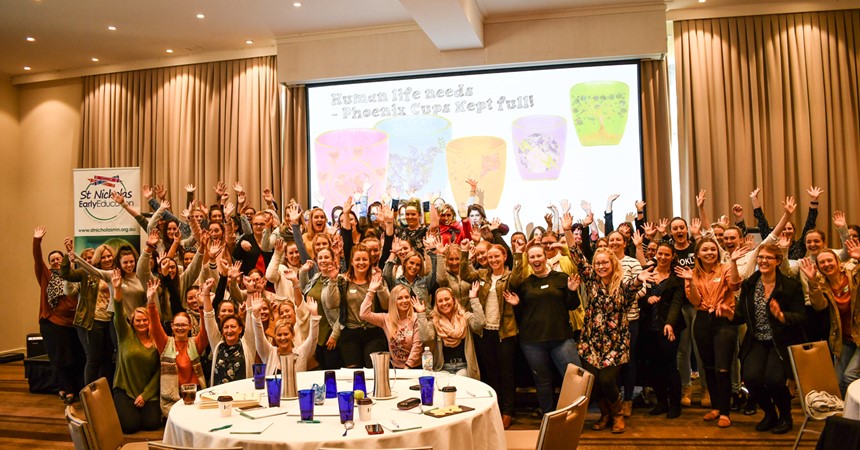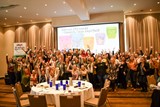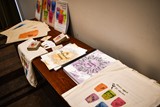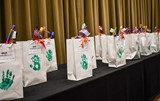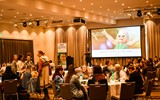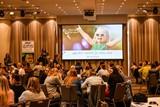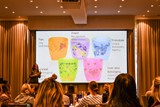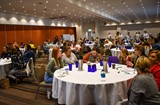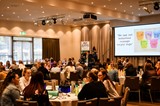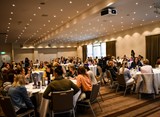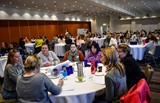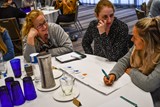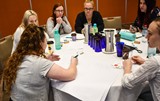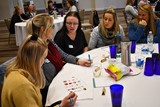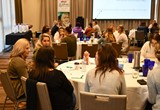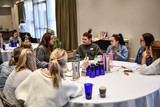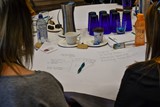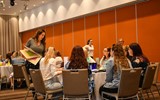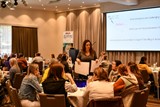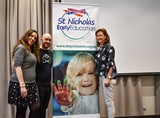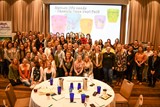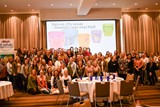For each person, the size of each cup varies and they are filled to varying levels. If you were able to see each person’s needs in this way, it would be possible to interact positively by ensuring your behaviour helps to fill each of their cups.
This is the basis of cup theory and it was the subject of the St Nicholas Early Education Professional Development Day held recently at the Crowne Plaza, Hunter Valley.
Professional Development at St Nick’s Early Education
The Professional Development Day was attended by more than 90 St Nick’s staff and educators. The great turnout and the enthusiasm of the attendees served as a testament to the dedication and passion of the entire St Nick’s team, including General Operations Manager, Kerri Armstrong. Kerri organised the event and opened the day with a heartfelt introduction full of gratitude.
“This time last year we had our Professional Development day right here at the Crowne. We had approximately 45 in attendance and we unpacked the Reggio Emilia philosophy to early education,” she said.
“I can’t believe, 12 months later, our agency has more than doubled in size. I stand here in front of 90 educators and I want to take this opportunity to share with you my gratitude.”
Kerri went on to share a quote she recalled about gratitude before thanking the room full of educators for their work and commitment to St Nick’s.
“I am incredibly grateful for the opportunity I have been given to create such an amazing early childhood organisation that values, not only the quality of education we deliver every day, but also the professionalism and commitment of its educators,” Kerri added.
The commitment of St Nick's educators was on full display throughout the day as they listened with rapt attention, took notes and broke off into groups to discuss cup theory and cup-filling strategies with their fellow educators.
Phoenix Support for Educators
The presenters for the professional development day were Sandi and Chris Phoenix of Phoenix Support for Educators, a duo who travelled from Queensland to speak about the Phoenix Cups framework and educator wellbeing.
Sandi introduced the concept of cups theory to the St Nick’s team by sharing a narrative of a day at a centre with four fictional children: Hope, Seth, Jayden and Sally.
Each child represented an archetype of children whose cups, their sizes and their level dictated their needs and thereby influenced their behaviour. As Sandi shared the relatable stories of these fictional children, she had the educators in the room nodding in recognition of children in their own centres whose needs presented themselves in similar behaviours.
After introducing the audience to these fictitious children, Sandi reiterated that, while a child’s behaviour might be obvious, the reason for that behaviour is less so.
In the case of Jayden, a child with many perceived behavioural issues, it was a difficult weekend with his mum that had him acting up after being dropped off at Sandi’s fictional centre.
After unpacking the idea that children’s behaviour is a manifestation of their needs and explaining how, rather than attempting to break that behaviour, a better solution would be to introduce cup-filling activities, Sandi asked the educators to talk amongst their tables about how the cup theory manifested itself at each St Nick’s centre.
Following a more detailed analysis of cup theory, Sandi invited everyone to work with the other educators at their table to choose a cup and discuss cup-filling strategies for that particular cup.
As the educators worked on developing their cup-filling strategies, Sandi and Chris went around the room to offer each group individualised assistance. They also passed out Phoenix Cup Filling Cards to help the educators ask the right questions to determine the best course of cup-filling action.
Educator wellbeing
After a delicious lunch, the St Nick’s team members were treated to an enthralling afternoon presentation led by Chris. This helped the educators with team building, thinking more clearly, being happier and more motivated and being more productive.
Chris played a series of games, the first of which involved tossing a ball to someone at the first table and inviting that person to write two words on a slip of paper and put it in a box.
Participants then had to toss the ball to the next table so the person who caught the ball could then go up to the front of the room, write two words and put their slip of paper in the box.
He then had everyone in the room stand up, put their hands out in front of them and imagine they were holding a brick in one of their hands. While some educators were able to keep their hands straight out in front of them, the imagination of others led one hand, the one holding the imaginary brick, to drop.
Chris then chose one of those participants to join him on stage, select a slip of paper from the box and draw an image representative of the word on the whiteboard - this while he attempted to draw the same image on another whiteboard.
The result of the Derren Brown-like experiment was that both Chris and St Nick’s Cardiff director, Dianna, drew monkeys.
The purpose of the experiment was to demonstrate the power of the subconscious mind which is always listening. This drove home one of Chris’ main points - that many of us hold onto unhelpful thinking styles and old habits which may no longer serve us.
Throughout the afternoon, Chris used fun and engaging activities and demonstrations to introduce staff to the power of the subconscious mind, unpack the connection between mind and body, assist in developing strategies which removed unhelpful thinking and introduce mechanisms for developing a capable self-image.
The overall tone of the day was one of excitement and empowerment. The day’s events encouraged educators to talk to one another, share and network between centres.
The knowledge Sandi and Chris shared offered the team ideas and strategies for coping with behaviour that challenge us and introduced concepts to put this new knowledge into practice at St Nick’s.
To find out more about St Nick's and what our expertly trained team of educators can do for you and your family, visit our website.
